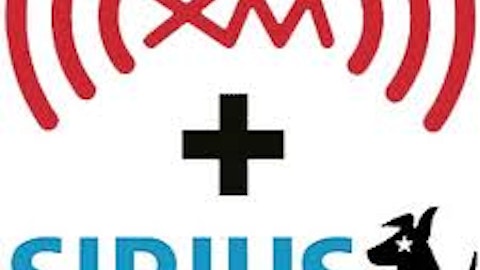The ability for it to access the large and growing Samsung user base is a key to Home’s success, as its pre-announced partner, HTC, is clearly losing ground to the competition. Furthermore, the release of Home aligns perfectly with the release of Samsung’s Galaxy S IV, so there’s potential for Facebook to partner with Samsung during its big marketing push.
Another incorrect prediction I made is that Facebook would be unable to gain support from the big wireless carriers – “It simply doesn’t make sense for big carriers, which rely on packaging texting plans with data plans, to promote a product that provides a significant threat to that business.” Sure enough, CEO Mark Zuckerberg announced plans to partner with AT&T Inc. (NYSE: T) and France Telecom-Orange.
This is reminiscent of another phone announcement some years ago by a different company. Partnering with wireless carriers is important in order to get phones in front of people where they shop for phones. It’s doubtful AT&T Inc. (NYSE:T) would have partnered with Facebook and HTC if it didn’t intend on promoting the phones in stores and on its website. AT&T will likely harp on its early exclusivity with hopes for another iPhone-like winner.
Google Inc (NASDAQ:GOOG) win or loss?
I previously wrote, “Google, for its part, will likely welcome a new Facebook feature. … If the new Facebook fork proves popular, there could be an uptick in Android sales.” I still believe this statement is true. The company released a statement after Facebook’s event – “It’s a win for users who want a customized Facebook experience from Google Inc (NASDAQ:GOOG) Play — the heart of the Android ecosystem — along with their favorite Google Inc (NASDAQ:GOOG) services like Gmail, Search and Google Maps.”
Unlike Amazon’s fork of the Android OS for its Kindle tablets, Home doesn’t get rid of the Google Play store or other Google Inc (NASDAQ:GOOG) services, which the company relies upon to generate profit from Android. And while Facebook is increasingly competing with Google in some respects, Google Inc (NASDAQ:GOOG) still has a lot to gain from the potential increase in Android market share driven byHome.
The fundamental changes in Home aren’t app purchases, mapping services, or internet searching. It’s in how users interact with Facebook, with a focus on messaging – an area where Google has only a small interest. Therefore, Home should be a win for Google Inc (NASDAQ:GOOG) should it prove popular.
Does engagement mean revenue?
The goal for Facebook appears to be improving user engagement with its products. Homemakes it easy to interact with your News Feed and integrates Facebook Messenger very nicely with the rest of the phone’s software. The question remains, can Facebook effectively monetize Home.
Mobile monetization is not a new issue for Facebook. I don’t think it would have invested the resources for such a product if it didn’t think it could boost mobile revenue with Home. While it eschewed the numerous roadblocks I previously believed posed a serious threat to this product’s success, it still needs to, first, become popular enough to turn on the ad-switch, and then stay popular once it does.
Adam Levy has no position in any stocks mentioned. The Motley Fool recommends Facebook and Google. The Motley Fool owns shares of Facebook and Google.
